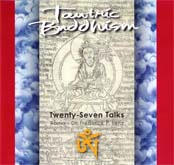
Tantric Buddhism
The Natural State
They say that faith can move mountains.
So can bulldozers, so can nuclear weapons - I'm not sure if that's really what faith is intended for. I guess if there's a mountain that has to be moved, and you've got nothing else to do it with, you could probably do it with faith.
I think faith is intended to enable us to discover who and what we are, what our purpose is in life and what life is. It's interesting - when you talk to someone in the West and very often in the East too, but particularly in the West, about the meaning and purpose of life - it is assumed that the a priori structure of life will remain in place, and we're talking about a substratum modification of how we live. That is to say, we're being philosophical.
Philosophy implies nothing active. Philosophy implies a passive expression that really has nothing to do with day-to-day existence. On the other hand, an ontological review of existence as such, with serious revisions of life, is the nature of self-discovery. In other words, self-discovery suggests that you will reach cosmological points of view, not philosophical but actual dialectical changes in the way the flow of consciousness passes in, above, around and through your mind, that will so change the reality that you perceive, even on a sensorial basis, that there will be nothing that is the same.
Self-discovery is not a submodification of how we live. It's not a methodology per se. We're dealing with changing the structural operation not of the mind - that's a submodification - but actually delineating new aspects of mind and experiencing them and literally removing that which was ourself and our perception, to move from the human level of perception - we'll take it that we all know what that means - to another method of perceiving life. To walk down a hallway and instead of seeing what you see today when you walk down a
hallway, to experience life - those moments of walking down a corridor in hundreds of states of mind, seeing the atoms move, perhaps, perhaps seeing everything in streams of light; perhaps being aware of hundreds of realities simultaneously as part of that hallway, perhaps seeing the corridors of eternity intertwined with the simple hallway that runs through a structural building. To see your life again and again as not just your life but as eternity; to be so completely integrated in the experience of perception that there's no sense of a perceiver but just the fluid moment of ecstasy that is reality unfolding itself to itself.
The politics of consciousness, the dialectical change of mind that occurs in Buddhism, is not simply the assimilation of a new philosophical basis or religious basis for viewing and interpreting experience. Rather it is the complete structural revision of that which is, from our point of view, that which is us - the mind, the perceiver. Life.
In the 1960s, the psychedelic revolution occurred and Timothy Leary, Richard Alpert and other people experimented with LSD, psilocybin, mescaline. They didn't do anything new. Similar psychotropic substances have been used in the Far East, in the American Indian culture, all over the world, for a long time. These drugs seemed to open up the doorways of perception and allow one to experience reality, what we've grown used to in the nine-to-five sense, as something totally different - to take a bubble bath and suddenly find oneself in a hundred universes and the bubbles have a meaning.
Everything, every atom, every part of life has a meaning, implies a meaning that cannot be thought about because we're in a pure dialectical state of attention in which there's no thought. The idea is that every atom of existence is reality and is perfect and is enlightenment.

